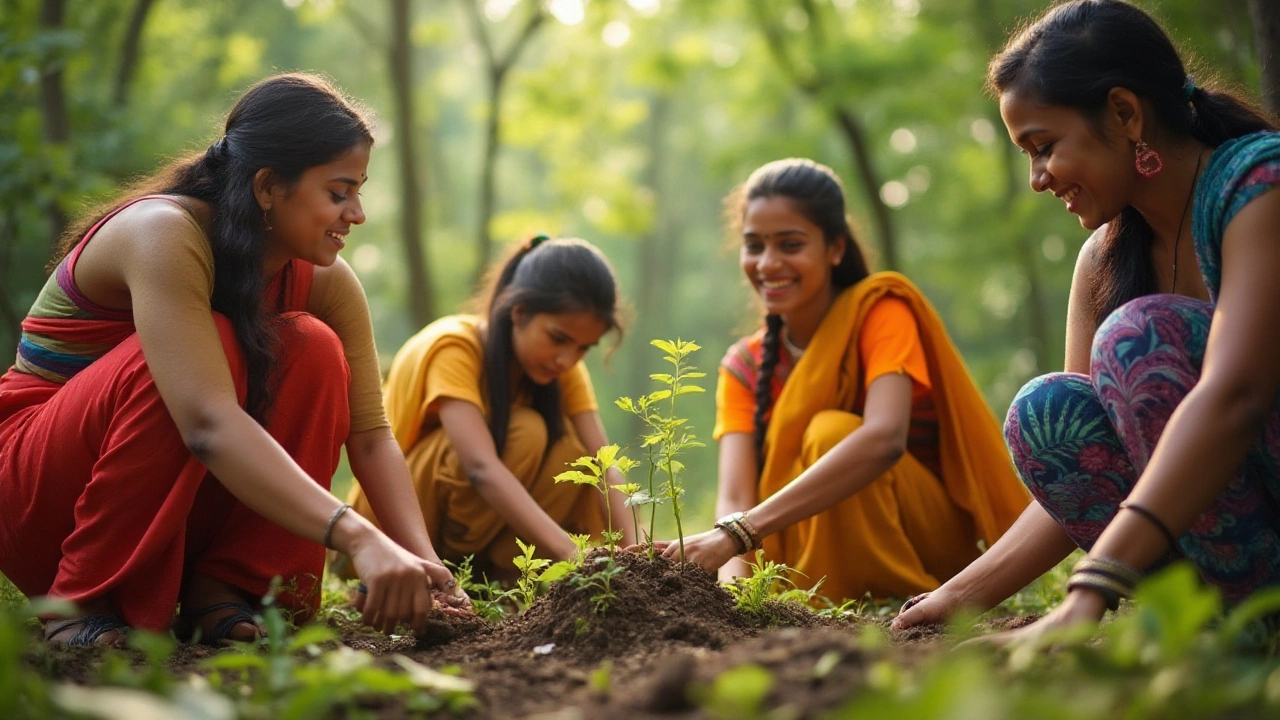Why Volunteerism Matters: The Heart of Compassionate Giving
 Jan, 9 2025
Jan, 9 2025
Volunteering stands as one of the most altruistic acts someone can engage in, showcasing human kindness and dedication without the expectation of payment. It's a selfless journey that individuals embark on to make a difference in their communities and beyond. But what exactly defines a volunteer, and why do so many people choose to give their time freely?
The concept of voluntarism has evolved, with people dedicating themselves to causes ranging from local community projects to global environmental initiatives. Volunteers are the backbone of numerous organizations, playing crucial roles in areas like healthcare, education, and community service, among others. Understanding what drives someone to volunteer can reveal much about the human spirit and our innate desire to help others.
This article dives into the world of volunteerism, exploring the motivations behind it, the profound impact it has across the globe, and how anyone can start their own volunteer journey. Whether you're an experienced volunteer or someone contemplating getting involved, uncovering these elements can inspire and guide you in making meaningful contributions.
- Defining a Volunteer
- The Motivations Behind Volunteering
- The Impact of Volunteering
- Getting Started with Volunteering
Defining a Volunteer
In the vast tapestry of human interactions, a volunteer is someone who decides to give their time and energy toward a cause they deem worthy, without expecting any financial gain in return. This definition may seem straightforward, but the spirit of volunteerism touches deeper aspects of human empathy and solidarity. Volunteers come from all walks of life and contribute to a variety of fields. From supporting children's education to aiding in environmental conservation efforts, their contributions shape and transform communities.
Delving deeper into what constitutes a volunteer, it's essential to recognize the diversity in their motivations and acts. Some individuals volunteer to gain new skills or to meet new people, while others may be driven by compassion after witnessing a community's needs. Interestingly, a study by the Corporation for National and Community Service found that individuals who volunteer regularly report greater life satisfaction, with some even experiencing health benefits. It's no wonder that so many find richness in giving back to the community.
The Many Faces of Volunteer Work
Volunteer opportunities are not confined to traditional settings. While many may envision volunteering at a soup kitchen or local hospital, the scope extends to virtual platforms, advocacy roles, and disaster relief. Initiatives like these display the dynamic nature of being a volunteer. The recent rise in remote volunteering has amplified the capacity for individuals to make a difference, regardless of geographical boundaries. Communicating across continents, people unite for a common cause, proving that the digital realm can foster a global community."The unselfish effort to bring cheer to others will be the beginning of a happier life for ourselves." - Helen KellerHow interesting it is to note that volunteering is as beneficial to the doer as it is to the receiver! Volunteers often gain a profound sense of purpose and accomplishment, which feeds into various aspects of their personal lives. Throughout any endeavor, there remains one constant: the genuine desire to help. This intrinsic motivation is the essence of volunteerism's power.
According to Volunteer Australia's 2022 data, around 6 million Australians serve as volunteers, proving that a significant part of society finds joy and fulfillment in contributing. These volunteers contribute a substantive amount of hours to countless causes, much of which would be impossible to achieve without their dedication. Their actions not only enrich them personally but can also instigate social change, leadership development, and community cohesion. Volunteerism holds this transformative power, waiting to be tapped into by anyone willing to lend a hand.

The Motivations Behind Volunteering
When it comes to volunteerism, the motivations can be as diverse as the volunteers themselves. Many people are driven by a sense of duty or a desire to give back to their community. This intrinsic motivation often stems from personal values, life experiences, or even gratitude for services once received. For some, it is about the personal satisfaction they derive from knowing their efforts have made a difference, however small, in someone else's life. Exploring the multitude of reasons why individuals choose to dedicate their time to voluntary work can provide deep insights into the human condition and the universal desire to connect and contribute.
One significant motivation for volunteering is the chance to learn new skills and gain valuable experiences that may not be available in paid work. Many people use volunteering as a way to pivot their careers, test out a new industry, or gain practical knowledge that complements their formal education. In fact, a study conducted by the Corporation for National and Community Service found that 82% of hiring managers across various sectors were more likely to choose a candidate with volunteer experience. This invaluable edge not only enhances one's resume but also builds a network of contacts that could open doors to new opportunities.
"Volunteering can be an opportunity to develop new skills, build confidence, and even enhance happiness," says Mark Greene, a veteran volunteer coordinator at a national nonprofit. "It's a two-way street where everyone stands to gain something—sometimes it's just as simple as a sense of fulfillment."Beyond personal growth, many are compelled to volunteer for social reasons. It's an effective way to make friends, expand a social circle, and foster a sense of belonging. Joining hands in a common cause strengthens bonds among individuals and builds a cohesive community spirit. People often find priceless camaraderie in these shared experiences, forming friendships that transcend age, background, and beliefs.
Another core motivation is the desire to effect positive change and leave a lasting impact on society. Volunteers play pivotal roles in addressing pressing global issues, from environmental conservation to social justice endeavors. Their efforts can empower communities, support marginalized groups, and even influence policy changes. In times of crisis, such as natural disasters and humanitarian emergencies, volunteers often emerge as the unsung heroes, showing the world what collective action can achieve.
Yet another compelling reason many choose to volunteer is the sheer joy of giving. Witnessing firsthand the transformative power of acts of kindness often renders the experience infinitely rewarding. Volunteers often find that their work brings about a higher sense of purpose and a deeper appreciation for the simple joys in life. By engaging in voluntary efforts, individuals align their passions with meaningful contributions, providing a sense of purpose and fulfillment that transcends material wealth.
Lastly, let's acknowledge the motivational impact of volunteerism in combating loneliness and enhancing mental well-being. Many volunteers report improvements in mental health, with decreased rates of depression and increased life satisfaction. Volunteering instills a sense of purpose and connectivity, counteracting the isolation that many experience in today’s fast-paced world. In essence, the motivations behind volunteering encompass a complex tapestry of altruism, personal benefit, social influence, and shared humanity, all knitted together by a common thread of hope and service. Through volunteering, individuals not only forge lasting ties within their communities but also contribute to a legacy of warmth and generosity that enhances the fabric of society itself.

The Impact of Volunteering
Volunteering leaves a substantial imprint on communities and individuals alike, echoing the endless ripple effects of a single act of kindness. The impacts are both visible and intangible, weaving through the fabric of society and touching lives in profound ways. One of the most striking effects lies in the ability of volunteerism to bridge gaps within societies, connecting individuals from various backgrounds and fostering a sense of unity and purpose. This shared mission often transcends cultural, economic, and social divides, allowing people to work towards a common goal. As volunteers invest time and effort into community services, they help address pressing issues from education to environmental conservation, directly improving the quality of life.
The personal growth of each volunteer is another incredible impact worth discussing. Engaging in volunteer activities builds character and encourages empathetic understanding. Individuals often find stronger emotional resilience and a sense of fulfillment through volunteering, as the act of helping others often leads to personal enrichment. It's a journey where many discover hidden skills and develop new relationships, boosting both confidence and social connections. Volunteering also fosters leadership skills and a sense of responsibility, providing volunteers with experiences that can translate into successful personal and professional lives.
Volunteerism fuels not only personal growth but also has a burgeoning impact on the economy. The unsung contributions of volunteers, estimated in billions globally, play a vital economic role. They fill critical gaps in services, adding value without significant financial cost to societies. Such contributions ensure smooth operations within numerous sectors, such as healthcare, where volunteer efforts are crucial. This financial alleviation allows for the reallocation of resources to other areas, optimizing societal development. According to studies, communities with robust volunteer participation often report higher overall social well-being and public health outcomes, marking the unmistakable influence of volunteers.
Impact on The Global Stage
Across oceans and continents, volunteering forms a keystone in the development of global initiatives. Organizations like the United Nations recognize and harness this power, recruiting volunteers to assist in diverse areas ranging from disaster relief to educational programs in underserved regions. Volunteers who partake in international missions bring back a wealth of cross-cultural understanding and awareness, carrying with them stories and lessons that promote global citizenship. These dedicated individuals help implement sustainable changes by empowering local communities with knowledge and resources, a fundamental step toward long-term development.Moreover, volunteering nurtures a cycle of giving and receiving that inspires societal participation and civic responsibility. A single act of kindness can ignite others to join the effort, expanding the reach and magnitude of positive impacts.
"The best way to find yourself is to lose yourself in the service of others,"famously quoted by Mahatma Gandhi, rings true as individuals discover more profound meanings in their lives through service. The growth of civic engagement as a result of volunteerism ultimately leads to strengthened communities that are more resilient to challenges and more adaptable to change.

Getting Started with Volunteering
Embarking on a journey into volunteerism is a decision brimming with purpose and the promise of new experiences. Taking the first step can often be the most daunting, not due to a lack of desire, but often because there are so many areas where one could contribute. The first crucial part of getting started is pinpointing your areas of interest. This could range from helping children learn to read, advocating for environmental conservation, or assisting at local health facilities. By identifying what you're passionate about, your commitment and enthusiasm for the volunteer work will naturally follow.
After defining your passion, consider the skills you can bring to the table. Volunteering is not just about labor; it's about contributing expertise, be it in writing, organizing events, mentoring, or whatever is in line with your strengths. Skills-based volunteering is a growing trend, offering specialized support to organizations that might not have financial means to access professional services.
Research plays an important role when embarking on your volunteer quest. There are countless organizations needing help, and each varies significantly in their missions, values, and the types of volunteering opportunities they offer. Utilize platforms like VolunteerMatch and Idealist to discover projects that align with your goals. It’s worth thinking local too, checking with community centers, schools, and local government initiatives to see where help is needed. Often, these grassroots organizations are where you can make the most immediate impact.
"The best way to find yourself is to lose yourself in the service of others." – Mahatma Gandhi
Consider the practical aspects as well. Time commitment is key, whether you can volunteer on weekends or a few hours here and there during the week. Organizations appreciate clear communication regarding availability, ensuring they can rely on you when needed. Additionally, some volunteering roles might require specific training sessions, so being flexible and open-minded can greatly enhance your volunteering experience.
Finally, don't underestimate the power of motivation in your volunteer journey. Joining a volunteering community can be a fantastic way to stay inspired and meet like-minded individuals. Many volunteers find that being part of a group brings a sense of camaraderie and shared purpose. These connections can be incredibly rewarding, offering both social and professional networks that enrich your life in unexpected ways. Many give back but often say they receive far more in return, be it in skills, friendships, or a deeper understanding of the world around them.